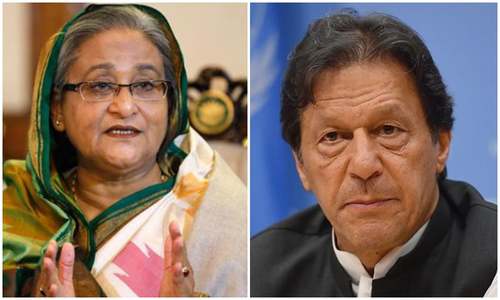THE Pakistan-Bangladesh relationship is weighed down by history. But if bilateral ties are to progress, both Islamabad and Dhaka must look forward instead of living in the painful past. Improvement in bilateral relations can even be a spur to reactivate the moribund Saarc, which in turn can help create a more integrated and peaceful South Asia.
While relations have mostly been frosty ever since Bangladesh Prime Minister Sheikh Hasina Wajed began her second tenure as prime minister in 2009, there have been welcome improvements this year. Perhaps the icebreaker was Prime Minister Imran Khan’s call to his counterpart in Dhaka in July, in which both sides exchanged pleasantries. Taking the process forward, Pakistan’s high commissioner in Dhaka recently called on the Bangladesh prime minister. The meeting was held in a cordial atmosphere, with both sides agreeing “to further strengthen the existing fraternal relations”.
Before Mr Khan took the initiative, the vibes coming out of Dhaka were anything but friendly. The key element poisoning relations was the resumption by the Bangladeshi leadership of the 1971 ‘war crimes’ trials, through which a number of people who had sided with Pakistan during the crisis were sent to the gallows. But perhaps a changing geopolitical climate has urged the Bangladesh administration to mend fences with Pakistan. After all, Dhaka-New Delhi ties have soured after the Modi government passed its controversial citizenship law, under which ‘Bangladeshis’ living in eastern India were threatened with deportation.
Whatever the reason for the change of heart, the fact is that Pakistan and Bangladesh must look beyond irritants and work to create a bilateral relationship based on mutual trust. The 1971 events were no doubt harrowing, but when Mujibur Rahman — Bangladesh’s founding father — himself had agreed to move on, why insist on resurrecting these demons? There should be an acknowledgment of the past, with Pakistan also examining its role in the 1971 debacle critically. The official release of the Hamoodur Rahman Commission report can be a starting point. This should be followed by a pledge from both sides to move forward and build a new future.
Indeed, if Pakistan and Bangladesh can manage to put their bitter history behind them, the same model can be replicated across South Asia. Other regional blocs such as the EU and Asean — where once staunch rivals agreed to bury the past — offer lessons for South Asia, should the countries of Saarc wish to learn from this model. Regional cooperation and economic activities can help break down the walls of mistrust that currently stand in the way of better integration in the subcontinent. The question is: are the states of South Asia willing to take a chance and work together to improve the lives of the nearly 2bn inhabitants of this region? Or will the current rotten status quo prevail, and with it conflict, disease and illiteracy?
Published in Dawn, December 5th, 2020













































